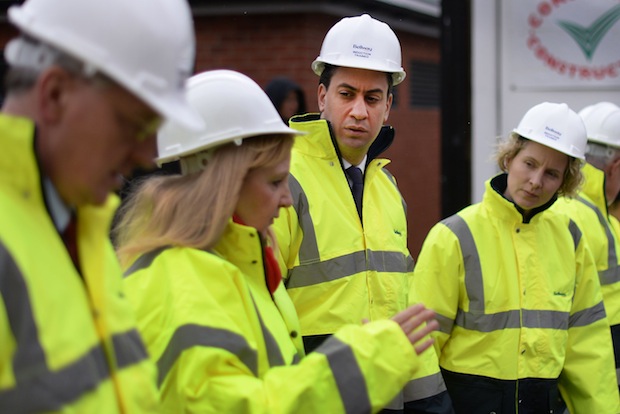Ed Miliband’s housebuilding announcement today is rather a re-heated announcement of his conference pledges on housing. Eric Pickles has already set out on Coffee House his belief that these new ideas are ‘more of the same high-tax and top-down policies that led to their housing boom and bust’. The announcement certainly allows for a bit of a knockabout between the two parties, neither of which has much to boast about when it comes to housing, but there’s one point that’s worth noting about the Labour leader’s announcement today.
Over the past few months, the party’s Shadow Communities and Local Government Secretary Hilary Benn and policy review chief Jon Cruddas have been mulling a new brand of localism for the Labour 2015 manifesto, which gives local people a ‘real choice’, and has its own special name. This is in part a political decision rather than a policy-based one: reinventing localism suggests that the current lot haven’t got it right.
But I’ve picked up on tensions at the top of the party on this. Other key thinkers are worried that this sort of fluffy localism doesn’t really work, and believe that their own experience in government with projects such as eco towns show that the state needs to be involved pretty closely with large scale new developments in order to get the houses built. They point to Macmillan’s success on housebuilding as proof that it has to be the state, not communities, that ensures the volume of houses needed are actually built. Ed Miliband’s announcement today on the Planning Inspectorate to arbitrate between local authorities to force housing development into action is a gesture towards that. He tries to balance giving communities a say with state action in his speech today by saying:
‘Of course it is right that local communities have a say about where housing goes. But councils cannot be allowed to frustrate continually the efforts of other councils to get homes built.’
But as Nick Boles points out, this means that local people in one area may not get a say in the expansion of the neighbouring town. Miliband is making a distinction here between local communities who might, given the right consultation, be eager for housebuilding in their area, and recalcitrant councils who might still then block that development. But this is not the sum total of his housing policy. At some point the party will need to decide whether it wants an active state that imposes big developments like garden cities on areas, or whether it wants to give local communities the opportunity to come up with these big-scale developments themselves. Conservative thinking before 2010 certainly tended towards the latter, although this has become rather muddier in practice (as the new Number 10 policy adviser on housing Alex Morton has eloquently explained). But Labour hasn’t quite decided between the two. It can’t have both, so one group of thinkers in the party is going to have to lose at some point in the next year. Currently it looks as though the big state idea is winning.







Comments